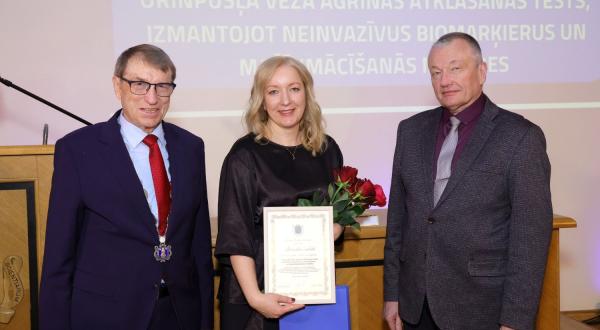RSU supported by MikroTik is planning to study paediatric cancer genes
Rīga Stradiņš University (RSU) in cooperation with Latvian IT company MikroTik submitted an application for international research grant “Latvian Paediatric Cancer Genome Initiative”. Within the framework of the initiative mentioned above, the DNA sequence of children with cancer will be studied. The study will lead to improved and personalised treatment for childhood cancer in Latvia.
 The main task of the Latvian Paediatric Cancer Genome Initiative will be to sequence and analyse the genomes of healthy and cancer-stricken cells in paediatric patients and later use the information obtained in treatment by thus reducing side effects. By understanding the genetics of cancer, it will be possible to design targeted therapies for individual patients. The ultimate aim of the research is to develop the first programme for precision medicine for young cancer patients in Latvia, similar to programmes already started in parts of USA and Europe.
The main task of the Latvian Paediatric Cancer Genome Initiative will be to sequence and analyse the genomes of healthy and cancer-stricken cells in paediatric patients and later use the information obtained in treatment by thus reducing side effects. By understanding the genetics of cancer, it will be possible to design targeted therapies for individual patients. The ultimate aim of the research is to develop the first programme for precision medicine for young cancer patients in Latvia, similar to programmes already started in parts of USA and Europe.
To reach this goal MikroTik has supported the RSU Institute of Oncology by donating 100 000 EUR for the purchase of additional laboratory equipment. RSU plans to receive additional funding also from an international grant.
Every year in Latvia, around 50 children are diagnosed with cancers, many of which are aggressive, hard to treat and with a high risk of mortality. Although the survival rates have improved greatly for some cancers, others still take a heavy toll on young people’s lives. In most cases, the standard treatments are general, non-targeted, and using cytotoxic drugs with side effects that can be serious and lifelong.
RSU rector Professor Aigars Pētersons stresses: “RSU is pleased to commence this innovative project in Latvia. Support provided by entrepreneurs to research is invaluable and necessary. It will foster more rapid development of research and the saving of lives of many children in Latvia.” According to the director of RSU Institute of Oncology Professor Edvīns Miklaševičs: “We are entering a new era in healthcare that will be based on genome analysis. Genetic testing of cancer patients could lead to clinical decisions that will improve the outcomes and quality of the life of children with cancer. Clinicians could choose targeted anticancer drugs that will have less side effects compared to traditional chemotherapy or radiation therapy.”
RSU Professor and the head of the Clinic of Paediatric Diseases of Children’s Clinical University Hospital Dace Gardovska is of the opinion that it is essential that the implementation of the project is planned in close cooperation with the leading haemato-oncologists and the families of patients. “Successful implementation of the project will increase Latvia’s opportunities for receiving support from foreign professionals in the treatment of rare diseases and selecting the most appropriate targeted therapies for individual patients,” stresses Professor D. Gardovska.
MikroTik Chairman of the Board John Tully states that "New technology holds the key to saving the lives of childhood cancer victims. MikroTik is committed to bringing the newest lifesaving cures and treatments to help paediatric cancer patients in Latvia.”
By comparing the genetic sequence of a patient’s tumour and normal cells, clinicians can determine which changes are more likely to be cancer-related and which treatments are likely to work. Establishment of the initiative will allow Latvia to follow the leading countries in cancer research and catch up with treatments being developed in Europe and the USA.
One of the tasks of the initiative will be the development of a genome database: a collection of genome sequences from children and young people with cancer. Using the database and sophisticated analytical tools, researchers will be able to pinpoint key genes (and other DNA sequences) that are altered in children who go on to develop cancer. In turn, they will gain insights into new prevention and treatment approaches for childhood cancer.
Related news
 RSU research project on early diagnosis of bladder cancer receives recognition from the Latvian Academy of SciencesRecognition, Research, Innovation
RSU research project on early diagnosis of bladder cancer receives recognition from the Latvian Academy of SciencesRecognition, Research, Innovation


